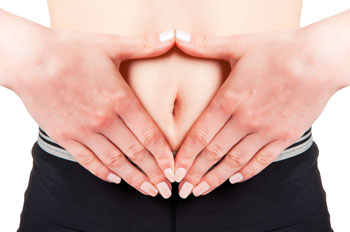 The first time it happens, you’re forgiven for thinking your pants had magically shrunk somewhere between lunch break and mid-afternoon. You find yourself unbuckling the top button, or loosening your belt, and sucking in your stomach when you get up from your desk, aware of a bulge that wasn’t there that morning. Worst of all is the cramped, stuffy feeling that goes with it.
The first time it happens, you’re forgiven for thinking your pants had magically shrunk somewhere between lunch break and mid-afternoon. You find yourself unbuckling the top button, or loosening your belt, and sucking in your stomach when you get up from your desk, aware of a bulge that wasn’t there that morning. Worst of all is the cramped, stuffy feeling that goes with it.
Bloating – it’s something most of us experience at least occasionally, and it’s gross.
That pressurised feeling is caused by gas that doesn’t get released through belching or passing air (charming, we know), and instead gets trapped in your digestive system. This gas is either just swallowed air (it’s believed that about half the gas that gets trapped in the abdomen is swallowed air) or produced by bacteria in the gut that help to digest food. Certain foods are more likely to cause bloating than others, so if you often experiencing bloating, try to avoid the following for a few days and see if it makes a difference:
• Beans and lentils contain indigestible sugars called oligosaccharides. These sugars must be broken down by bacteria in the intestines.
• Gassy vegetables such as Brussels sprouts, cabbage, cauliflower, broccoli, carrots, prunes and apricots contain sugars and starches that may cause gassiness and bloating.
• Artificial sweeteners often contain ingredients that cannot be digested.
• Dairy products can cause bloating if you have trouble digesting lactose, or milk sugar.
• Whole grains have a high fibre content, but fibre is an indigestible carbohydrate. Usually this is not a problem – in fact, fibre is an essential part of a healthy diet – but a sudden increase in fibre consumption can cause gas, bloating and constipation. Rather increase fibre in your diet slowly, giving your body time to adjust, and drink plenty of water.
• Fatty foods can cause bloating as fat takes longer to digest than carbs or protein, so it can increase the sensation of fullness.
Apart from the types of food we eat, there are a number of other conditions that can cause bloating:
• Overeating: Eating too much, too quickly can put pressure (ahem) on your digestive system. Stick to smaller portions, and eat slowly so your body has time to signal satiety.
• Stress: When we’re feeling panicky or anxious, our body goes into fight or flight mode, during which our brains may slow down our digestive process, since it takes up a lot of energy (which, hypothetically, would be more prudently used to flee – or fight). Meditation, exercise, yoga or counselling can all help to reduce stress – and bloating.
• Smoking: Another reason to quit – it’s been linked to bloating, heartburn, and other digestive problems.
• Lactose intolerance: When your body can’t break down the lactose in dairy products, it will pass to the colon where gas is produced by the bacteria trying to break it down. If you cut out dairy and your bloating disappears, you may be lactose intolerant.
• Menstrual bloating: Every woman is different, but most of us experience bloating at some stage during our menstrual cycle thanks to hormone fluctuations. Lucky us! Eating correctly, exercising regularly and practising stress reduction techniques can help to alleviate the symptoms.
• Pregnancy: The hormone progesterone, which increases during pregnancy, slows down digestion, giving nutrients from the food we eat more time to enter the bloodstream and nourish your baby – this also causes bloating. Drink plenty of water, which can help to reduce constipation, and cut down on foods that can encourage bloating.
• Irritable bowel syndrome (IBS): This is a chronic condition that causes gas, cramps, diarrhoea and/or constipation, and can be quite painful. Its exact causes are not known, but are believed to be related to hormone levels, stress and diet. The main difference between IBS and mere bloating is the severity of symptoms, which can be disabling for many IBS sufferers[. Also, according to the Mayo Clinic, people with IBS may have abnormal serotonin levels: serotonin is a chemical messenger that’s normally associated with brain function, but it also plays a role in normal digestive system function. If you suspect you have IBS, consult your doctor, who will be able to help you manage your symptoms.
• Coeliac disease: This is an autoimmune disorder of the small intestine that prevents your body from digesting and absorbing certain components of food. Chances are, your bloating is due to one of the reasons above, not coeliac disease, which is rare. However, if you experience bloating on a regular basis and you have eliminated the causes above, consult your GP.
Image: ruigsantos/Shutterstock.com




33 Responses
most of the info here I didn’t know about it, really informative
A follow-up article on exercises or foods to help work against bloating would be great!
Very informative